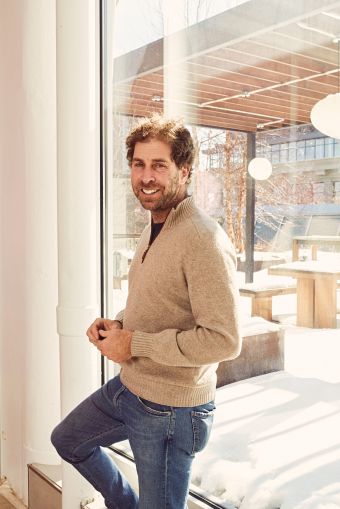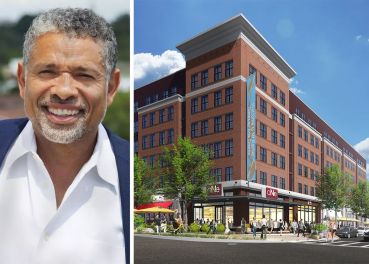Jed Walentas on Taking Over for Douglas Durst as REBNY Chair
Two Trees’ Jed Walentas brings what he calls ‘relentless incrementalism’ to the REBNY chairmanship at an auspicious time for the group and its industry
By Mark Hallum January 16, 2024 1:00 pm
reprints
But Jed Walentas still takes over REBNY’s chairmanship from Douglas Durst at an auspicious time. There’s that aforementioned economic recovery — still a bit tenuous and largely dependent on the actions of the Federal Reserve Board. There’s also a historic immigration crisis in New York City. And myriad issues confronting the industry such as a lack of a 421a-like development incentive for apartments. Plus, while workers are returning to the office, they’re not exactly returning in droves.
Walentas and the family firm his father, David, started have experience in turnarounds, though. Their Two Trees Management, famous for the transformation of Brooklyn’s Dumbo from seedy post-industrial to modern uber-hip, is also behind the redevelopment of a pocket of the nearby Williamsburg waterfront now known as Domino Park into a premier recreation spot. That has involved turning a 19th-century warehouse, the Domino Sugar Refinery, into modern office space. That space went on the market last year.
Walentas sat down with Commercial Observer last week to talk about his priorities going into his new role as REBNY chairman.
This interview has been edited for length and clarity.
Commercial Observer: What do you envision for REBNY as the incoming chairman?
Jed Walentas: One of the things that’s great about our industry is that we’re really inextricably tied to the health and welfare of the city. And, unlike anything else, more than any other industry, the real estate industry is really a referendum on the city’s health. All of my colleagues really firmly understand and believe that. In our best moments, it forces us to try and act from both an individual standpoint and a policy standpoint in ways that are making the city better long term.
That synergy, I think, is both healthy and helpful in everything that we do, and certainly it’s how we try and run our business. So how do you make the real estate business better is how do you make New York City better, and working with our elected officials is how you do that.
In a more micro sense, in the near future, we need to solve the housing situation. Political rhetoric aside, supply and demand fundamentals are what they are. There are 80 years of cumulative policy errors that have led to a dramatic undersupply of housing, and we need to fix that across all income streams.
What are some of your main priorities, and how will you negotiate with lawmakers?
Communication and information are the most important things. I think, with any conflict, things become more intractable when people aren’t really seeking out real information or trying to hear where the other side is coming from. So I think always start with that: create lines of communication, create openness, create a personal rapport.
Not that you have to be best friends with everybody, but conduct yourself with integrity and don’t mislead people, and start to build lines of trust and really listen. Even if I think people are misguided or wrong, for the most part, they’re not coming from a completely fictitious place, right? They’re not making up their experiences that lead them to wherever they happen to be on a certain issue, even if they disagree with me or with most of our members. Then you can start to thread through solutions that work for everybody.
What are your thoughts on replacing 421a?
Probably 90 percent of our industry is uniquely coming from our city’s history in the ’70s and the fiscal bailout, so most of our eggs lie in the state’s basket. So, working with the governor and our staff, with both houses of the legislature, is critically important.
It’s a big, complicated state. It’s a big, complicated city. But if you listen carefully to what people say, I think it’s becoming more and more apparent that there’s an overwhelming need for housing. There’s no other solution than the private sector for creating it, and it’s a problem that needs to be solved. It needs to be solved in massive numbers and quickly.
Whether it was genuine or slightly not genuine, I think the rhetoric that developers would just build rental housing in any economic environment has clearly been proven to be false. The data just speaks for itself. And the exacerbating problem is the two biggest contributions to whether the real estate industry’s projects work economically are, as I said, the health of the city and interest rates.
And the interest rate environment is radically different from the last time we’ve had to face these policy decisions. It’s going to provide a further challenge to solving all of our problems. It provides more of a challenge for the government and, to be honest, provides a lot of challenges for us. So it’s not going to be easy. It’s going to take what my friends and I call relentless incrementalism. There’s no silver bullet here. It’s going to take lots of sustained work.
It’s not starting with me. I mean, Douglas Durst did a spectacular job during his time as chair. The people before him, too. I’ve been working on this for a long time, the REBNY staff gets up every day and works on this. And, listen, the people on the other side work on this every day, too. There’s a lot of people in the city that care about housing, they care about the needs of people, and care about everyone getting a roof over their head. So it’s not like I’m coming in here and we’re starting this conversation. We’re gonna keep working until we find solutions.
Did you ask Durst for any advice in stepping into this role?
I try to take as much advice from as many people as I possibly can. So I certainly look to Douglas, to all the preceding chairs. And, not only that, but there are lots of people, lots of colleagues in my industry, with lots to offer who weren’t necessarily in the chairman’s seat who have seen a lot more than I have in their lives.
What are your thoughts on Local Law 97, the city’s carbon emissions rule for buildings?
I think with any public policy, you want to focus first and foremost on total public benefit and total public cost. And then you want to think about allocation, right? You want to make sure if you’re spending $100 to create $20 of benefit — and I don’t mean private benefit, I mean total aggregate benefit to all constituents — that’s bad policy. If you’re spending $20 in costs to create $100 in benefits, that’s a good policy, and then it becomes much easier to figure out who the specific beneficiaries are.
With the climate issue, data and measurement are really, really, really hard. But I think to the extent that we weigh in and I start to learn more and more about it, the first piece is, “OK, let’s make sure from a pure policy standpoint that we’re creating a cost paradigm where the benefits to society in aggregate far outweigh the costs.” And then we can go from there and make sure that we’re not creating perverse incentives and doing weird things.
How is Two Trees doing?
The industry is a lot harder than it was three or four years ago. Cost of capital is way higher. A huge amount of our portfolio is commercial office. The world is a lot harder than it used to be. At the same time, we’re doing great, nobody’s more fortunate than we are.
We’re finishing 560 apartments in 2024. We’re finishing the last piece of Domino Park. We make a lot less money than we used to, and that’s OK. We had no entitlement to how much money we used to make and we’re super proud of our projects. Things go up and down, and you get up every day and do your best.
Are you looking at any adaptive reuse opportunities in your office portfolio?
Not right now. We’ll see how the next couple of years go. We’re trying to be good to our tenants. Just like the industry has a referendum on the health of the city, office building owners have a referendum on the health of their tenants. So the more we can do to help our companies make money and grow healthier, we’re going to be spending a lot of time trying to help all of them and build relationships to make the experience better every day on the commercial side.


